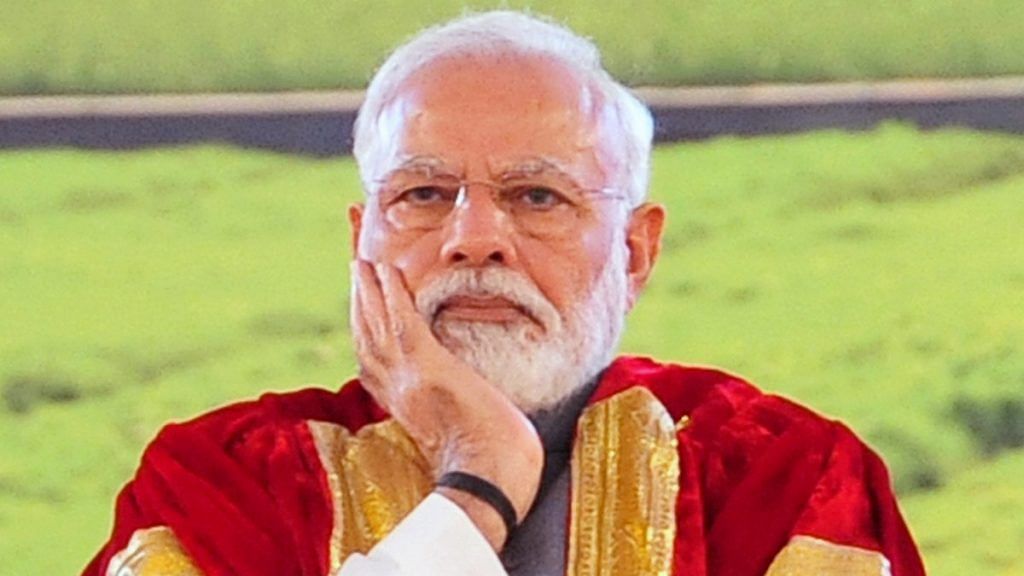New Delhi: Prime Minister Narendra Modi has warned India’s top pharmaceutical companies to strictly adhere to marketing ethics, and not to bribe doctors with women, foreign trips and gadgets, ThePrint has learnt.
Government sources said PM Modi met senior officials from top drug-makers, including Zydus Cadila, Torrent Pharmaceuticals and Wockhardt, in New Delhi on 2 January.
“The issue of unethical use of marketing tactics has been escalated to the Prime Minister’s Office (PMO) which, in turn, made calls to some top drug-makers and fixed a meeting with the PM,” said a senior government official who attended the meeting.
“The PM told drug-makers that their non-compliance with marketing practices is pushing the government to create a strict law. He has warned about bringing in a statutory provision, and indicated that the ministry (of chemicals and fertilisers) has been asked to start working on it,” the official said.
Top executives such as Pankaj Patel of Zydus Cadila, Sudhir Mehta of Torrent and Habil Khorakiwala from Wockhardt were in attendance, apart from the leadership team of Apollo Hospitals, sources said.
There was no response to emails and text messages sent to Patel, Mehta, Wockhardt and Apollo Hospitals until the time of publishing this report.
ThePrint also reached the PMO through calls and text messages for a comment but there was no response.
Also read: Modi govt plans action against US writer who said Indian drugs are ‘flea-market quality’
The report that led to the move
The move is triggered by a report published by NGO Support for Advocacy and Training to Health (SATHI), which suggested that medical representatives (MRs) — the people who pitch products directly to doctors — bribe them with foreign trips, expensive smartphones and even women.
The report said MRs have paid for “purchase of cars, international conferences, online shopping vouchers and even female companionship for doctors”.
The report alleged that “the ethics and values which were followed in the past are getting bypassed” and “often these codes are not adhered to achieve business”.
“Some doctors who give huge business demand women for entertainment and these demands are met,” the study found, based on the responses of MRs. “Such arrangements are done by a senior level management, and MRs are not directly involved, and are reserved only for the doctors who give enormous business.”
It found that “in many deals involving high value offers such as instalment on the purchase of a car; the company threatens the doctor of dire consequences if the targeted business is not achieved”.
Also read: Modi govt plans new single-window clearance process to revive FDI in pharma
Voluntary code of ethics
After the SATHI report was made public, the Department of Pharmaceuticals (DoP), the apex body on drug policies in India under the chemicals and fertilisers ministry, pulled up the pharma giants for their poor compliance.
On 23 December, DoP secretary P.D. Vaghela also conducted a review meeting with three drug-maker associations — the Indian Drug Manufacturers’ Association (IDMA), the Indian Pharmaceutical Alliance (IPA) and the Organisation of Pharmaceutical Producers of India (OPPI). Vaghela pulled them up for not complying with the Uniform Code of Pharmaceuticals Marketing Practices (UCPMP).
However, the UCPMP, released in 2014, is a voluntary code related to marketing practices for pharmaceutical companies and the medical devices industry. It stops pharma firms from gifting sample products to healthcare professionals. The code states that each sample pack given to a doctor should be limited to the prescribed dosage for three patients.
It also says “no gifts, pecuniary advantages or benefits in kind may be supplied, offered or promised to persons qualified to prescribe or supply drugs, by a pharmaceutical company or any of its agents i.e. distributors, wholesalers, retailers etc.”.
The code is applicable not just to healthcare professionals but also their family members. It also says “companies or their associations shall not extend any travel facility inside the country or outside including rail, air, ship, cruise tickets, paid vacations, etc. to healthcare professionals and their family members for vacation or for attending press conferences”.
Also read: India could soon find all its ‘missing million’ TB patients — highest-ever detection in 2019
